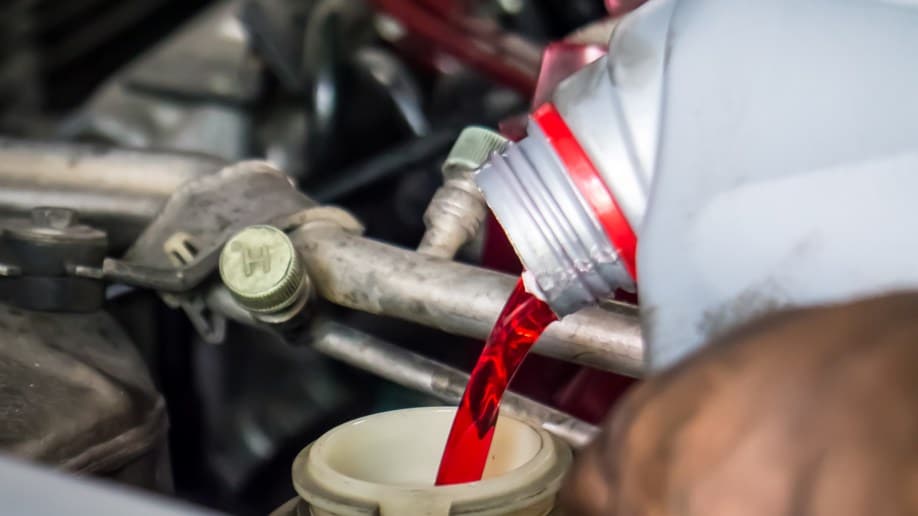As an Amazon Associate, I earn from qualifying purchases at no extra cost to you.
How Often Replace Transmission Fluid: Important Maintenance Tips!
Transmission fluid should be replaced every 30,000 to 60,000 miles depending on the manufacturer’s recommendations and driving conditions. Regular transmission fluid changes are essential for ensuring optimal performance and longevity of your vehicle’s transmission system.
Your vehicle’s transmission relies on fluid to lubricate and cool its various components. Over time, the fluid can become contaminated with debris, worn-out friction materials, and moisture, which can compromise its effectiveness. Replacing the transmission fluid at regular intervals helps to maintain proper lubrication, prevent excessive wear and tear, and avoid costly repairs.
Ignoring or neglecting to change the transmission fluid can result in sluggish shifting, overheating, and even transmission failure. Therefore, it is important to consult your vehicle’s owner’s manual or contact a qualified mechanic to determine the appropriate interval for changing the transmission fluid based on your specific vehicle and driving habits.
Signs That Indicate The Need For Transmission Fluid Replacement
Signs that indicate the need for transmission fluid replacement
Regular maintenance is crucial for the smooth operation of your vehicle’s transmission. One important aspect of maintenance is replacing the transmission fluid when needed. Over time, transmission fluid can become contaminated or break down, resulting in inefficiencies and potential damage to your vehicle’s transmission system. Here are some signs that indicate it’s time to replace the transmission fluid:
Leaking Fluid
Leaking fluid is not only a sign that you may need a transmission fluid replacement, but it can also indicate a more serious problem with your transmission system. If you notice red or brown fluid underneath your vehicle, it’s important to address the issue promptly. Leaking transmission fluid can lead to inadequate lubrication, which can cause internal damage to the transmission components. Make sure to check for leaks regularly and have them repaired as soon as possible to prevent further damage.
Slipping Gears
Slipping gears is another common sign that you may need to replace the transmission fluid. If you notice that your vehicle is having trouble staying in the correct gear or is shifting erratically, it could indicate that the transmission fluid is old or contaminated. Over time, transmission fluid loses its viscosity, which can cause gears to slip or not engage properly. This can result in reduced power, poor acceleration, and even complete transmission failure. Replacing the transmission fluid can help restore proper gear functioning and prevent potential transmission issues.
Burning Smell
Another indication that it’s time to replace the transmission fluid is a burning smell. If you notice a distinct burning odor coming from your vehicle, especially when the transmission is engaged, it could be a sign that the transmission fluid is overheating. Over time, the friction and heat generated by the transmission can cause the fluid to break down and lose its effectiveness. This can lead to increased friction and heat buildup, further damaging the transmission components. Replacing the old fluid with fresh transmission fluid can help dissipate heat and prevent potential damage.
Don’t ignore these signs that indicate the need for transmission fluid replacement. Regularly checking and replacing the transmission fluid can help maintain the health of your vehicle’s transmission system, ensuring smooth gear shifting and extending the lifespan of your transmission. If you notice any of these signs, it’s important to consult your vehicle’s owner manual or take your vehicle to a qualified mechanic for further inspection and maintenance.

Credit: www.kbb.com
Frequency Of Transmission Fluid Replacement
The frequency of transmission fluid replacement depends on several factors, including the vehicle’s manufacturer recommendations and driving conditions. It is generally recommended to replace the transmission fluid every 30,000 to 60,000 miles to ensure optimal performance and longevity of the transmission.
Frequency of Transmission Fluid ReplacementRegular maintenance of your vehicle’s transmission is essential to ensure its smooth operation and longevity. One crucial aspect of transmission maintenance is the regular replacement of transmission fluid. The frequency at which you should replace your transmission fluid depends on several factors, including the manufacturer’s recommendations, driving conditions, vehicle age, and mileage.Manufacturer’s recommendations One of the key factors to consider when determining how often to replace your transmission fluid is the manufacturer’s recommendations. Automobile manufacturers provide specific guidelines on when transmission fluid should be replaced. These recommendations often take into account the type of transmission, the fluid’s lifespan, and the vehicle’s operating conditions.Driving conditions The driving conditions you encounter regularly can have an impact on the frequency at which you should change your transmission fluid. Conditions such as stop-and-go city driving, towing heavy loads, or driving in extreme temperatures can put stress on the transmission and cause the fluid to degrade more quickly. In such cases, more frequent fluid changes may be necessary to maintain optimal performance and prevent potential damage.Vehicle age and mileage Another crucial factor to consider is the age and mileage of your vehicle. As your vehicle ages and accumulates mileage, the transmission fluid may break down and lose its effectiveness. Over time, the fluid’s ability to lubricate and cool the transmission components may decrease, potentially leading to increased wear and heat build-up. Therefore, older vehicles or those with high mileage may require more frequent transmission fluid changes to ensure continued smooth operation.It is important to consult your vehicle’s owner’s manual or contact the manufacturer to determine the specific guidelines for your vehicle. Following the recommended maintenance schedule will help you keep your transmission running smoothly and extend its lifespan.Table: Manufacturer’s Recommendations| Vehicle Make | Recommended Frequency |
|---|---|
| Ford | Every 30,000 to 60,000 miles |
| Toyota | Every 60,000 to 100,000 miles |
| Chevrolet | Every 50,000 to 75,000 miles |
Also Read: How to Fix Transmission Slip: Easy Solutions
Diy Vs Professional Transmission Fluid Replacement
When it comes to maintaining your vehicle’s transmission, replacing the transmission fluid is a critical task that should not be overlooked. The transmission fluid plays a crucial role in ensuring smooth gear shifting and proper lubrication of internal components. However, the question arises – should you perform this task yourself or seek professional help? Let’s take a closer look at the benefits of DIY transmission fluid replacement and professional replacement.
Benefits Of Diy Replacement
- Cost savings: By opting for DIY transmission fluid replacement, you can save on labor costs associated with professional services.
- Flexibility: This option allows you to carry out the task at your own convenience, without having to schedule an appointment or wait for a workshop availability.
- Knowledge and control: By performing the replacement yourself, you gain a better understanding of your vehicle’s transmission system and have full control over the process.
- Routine maintenance: DIY replacement gives you the opportunity to regularly check for any signs of damage or leaks, allowing for necessary repairs before they escalate.
- Pride in ownership: Completing a DIY task successfully provides a sense of accomplishment and strengthens the bond with your vehicle.
Benefits Of Professional Replacement
- Expertise and experience: Professional technicians possess the necessary knowledge and expertise to efficiently carry out transmission fluid replacement, ensuring it is done correctly.
- Specialized equipment: Professionals have access to specialized tools and equipment that are required for a thorough and precise fluid replacement.
- Warranty protection: In many cases, professional replacement comes with a warranty, providing peace of mind in case any issues emerge after the service.
- Time-saving: Having professionals perform the replacement saves you the time and effort required to research, gather tools, and complete the task yourself.
- Familiarity with different transmission types: Expert technicians are familiar with various transmission types and can handle any specific requirements of your vehicle.

Credit: www.capitalone.com

Credit: www.pinterest.com
Frequently Asked Questions On How Often Replace Transmission Fluid
Do I Really Need To Change My Transmission Fluid?
Yes, changing your transmission fluid is necessary to maintain the health and durability of your vehicle’s transmission system. It helps to lubricate, cool, and clean the internal components, ensuring smooth shifting and preventing costly repairs in the future. Regular fluid changes are recommended by manufacturers to prolong the life of your transmission.
What Happens If You Never Change Transmission Fluid?
If you never change transmission fluid, it can lead to damage and malfunctioning of the transmission system. Over time, the fluid gets contaminated and loses its lubricating properties, causing increased friction and heat. This can result in transmission overheating, poor shifting, and even complete failure.
Regular fluid changes can extend the lifespan of your transmission.
Does Transmission Fluid Last A Lifetime?
No, transmission fluid does not last a lifetime. Routine maintenance is necessary to replace and change the fluid periodically to ensure smooth functioning of the transmission system. Ignoring this can lead to issues like overheating, poor performance, and even transmission failure.
How Do You Know If You Need Transmission Fluid?
Transmission fluid should be checked regularly to ensure it is not low or contaminated. Look for signs of a burning smell, difficulty shifting gears, or leaks under the vehicle. If you experience any of these issues, it may be time to top up or change your transmission fluid.
How Often Should You Replace Transmission Fluid?
It is recommended to replace the transmission fluid every 30,000 to 60,000 miles or as per your vehicle manufacturer’s guidelines.
What Are The Signs Of Dirty Transmission Fluid?
Signs of dirty transmission fluid include slipping gears, shifting delays, strange noises, fluid leaks, and burning smell.
Can I Flush The Transmission Fluid Myself?
While it is possible to DIY flush, it is recommended to have it done by a professional to avoid any damage or incorrect procedure.
Why Is It Important To Replace Transmission Fluid Regularly?
Regularly replacing transmission fluid helps maintain proper lubrication, prevents wear and tear, and increases the lifespan of the transmission.
Conclusion
Maintaining regular transmission fluid changes is essential for the longevity and performance of your vehicle. By following the manufacturer’s recommendations and considering factors like driving conditions and mileage, you can ensure the proper functioning of your transmission system. Neglecting this maintenance can lead to costly repairs and reduced efficiency.
So, make sure to prioritize this aspect of vehicle care to keep your transmission running smoothly for years to come.


